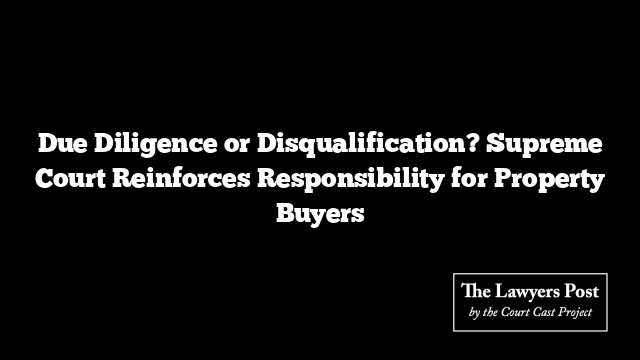The Supreme Court has ruled that individuals purchasing immovable property must conduct thorough inquiries into the title and possession of the property to claim protection as “bona fide purchasers” under Section 19(b) of the Specific Relief Act, 1963. This ruling underscores the necessity of due diligence in property transactions, disqualifying subsequent buyers who neglect to verify the rights of current possessors.
The decision arose from a dispute involving an oral agreement to sell a property. Despite this agreement, the seller transferred the property to subsequent buyers who later claimed the protection of “bona fide purchaser” status. Both the trial court and the High Court found in favor of the original buyer, rejecting the subsequent buyers’ claims. The Supreme Court upheld these findings, emphasizing that mere reliance on a seller’s assurances is insufficient.
Key to the Court’s decision was the fact that the plaintiff’s husband, a mortgagee, held possession of the property. According to the Court, possession serves as constructive notice, obliging prospective buyers to investigate the rights and interests of those in control of the property at the time of purchase.
The judgment also highlighted the broader implications of neglecting such inquiries. It cited previous rulings, including R.K. Mohammed Ubaidullah v. Hajee C. Abdul Wahab (2000), where the Court held that a purchaser must investigate not only the title but also the nature of possession of those occupying the property. Similarly, in Ram Niwas v. Bano (2000), the Court ruled that purchasers cannot claim ignorance if they fail to probe the actual nature of possession.
The Court reinforced the principle that “good faith” in property transactions requires honesty, due care, and attention. It referred to definitions under the Bhartiya Nyaya Sanhita, 2023, and the General Clauses Act, emphasizing that negligence or dishonesty disqualifies claims of acting in good faith.
The judgment serves as a stern reminder to property buyers: neglecting proper inquiries could lead to forfeiture of legal protections. By holding that the appellants had not acted in good faith, the Court dismissed the appeal and affirmed the plaintiff’s right to seek specific performance of the original agreement.





